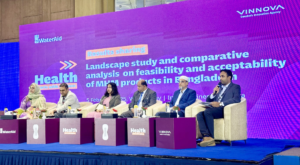
Menstrual hygiene management (MHM) remains a critical yet often overlooked aspect of women’s health and well-being in Bangladesh. Despite progress, significant challenges persist, particularly for female workers in ready-made garment (RMG) factories and women in low-income communities. To address these gaps, WaterAid Bangladesh, in collaboration with Innovision, conducted a comprehensive landscape study assessing the feasibility, accessibility, and acceptability of MHM products across the country.
The findings were presented at a result-sharing event on February 5, 2025, where stakeholders from the government, private sector, and development organizations convened to discuss the barriers and opportunities in menstrual hygiene management. Md. Rubaiyath Sarwar, Managing Director of Innovision, shared key insights from the study, shedding light on gaps in market structure and product accessibility that hinder women and adolescent girls from managing their menstruation hygienically.

Distinguished government representatives, including Md. Shamsul Islam (Deputy Secretary, Ministry of Labour and Employment), Tanzila Khanom (Deputy Secretary, Secondary and Higher Education Division), and Dr. Md. Shamsul Hoque (Program Manager, DGHS), emphasized the need for policy-driven solutions. Tanzila Khanom stressed the importance of shifting societal perspectives, stating, “Male engagement needs to be increased. Menstruation should be viewed with respect. We must ensure that no woman faces superstition or risk.”
A milestone achievement was also announced at the event. Tahmid Kamal Chowdhury, Founder and CEO of Safepad, revealed that reusable menstrual pads have been formally recognized by BSTI (Bangladesh Standards and Testing Institution), marking a significant step toward sustainability. “We have reached one and a half lakh customers. Now, through the gazette, BSTI has recognized reusable pads. This is a huge step,” he noted.
The discussions underscored the urgent need for multi-sectoral collaboration to improve menstrual hygiene management in Bangladesh. Enhancing awareness, reducing stigma, and ensuring access to safe and affordable menstrual hygiene products remain key priorities. With growing policy support and industry engagement, Bangladesh is making strides toward a future where no woman or girl is left behind in accessing essential menstrual health products and education.